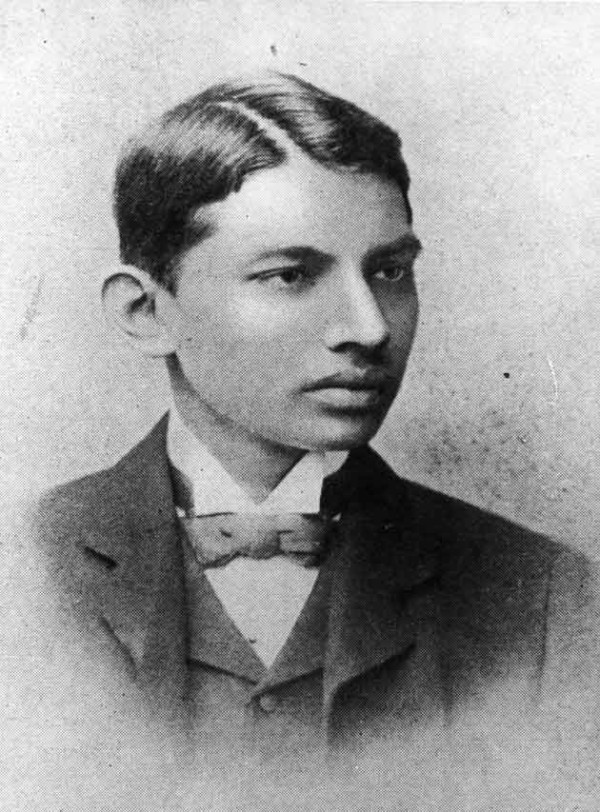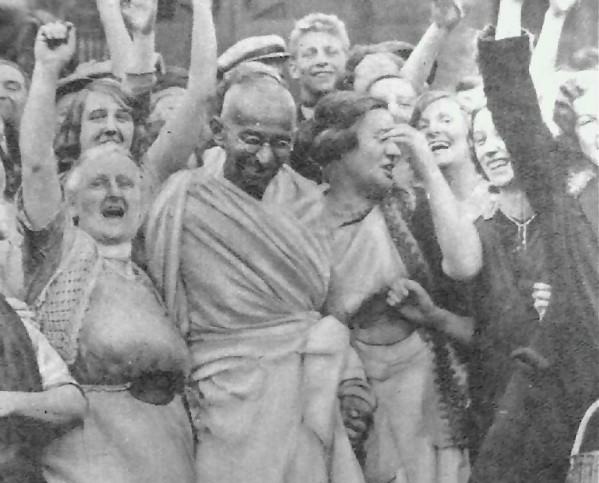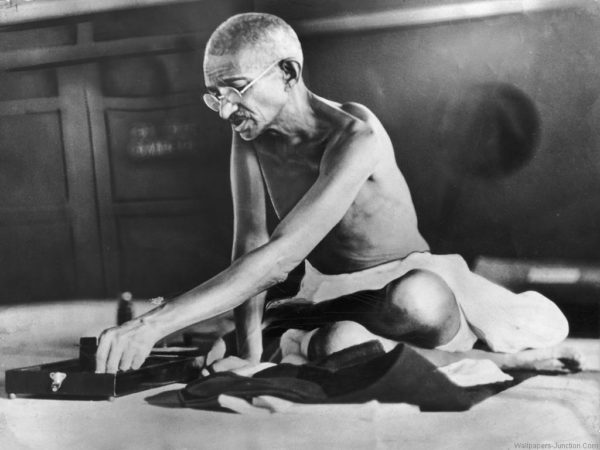I bet you new age zombies didn't even know Gandhi was a racist and btw MLK loved this man and his tactics.........
Notice the trend also of guised racist behavior towards our people from our resident dot heads and half breed dot heads......@Mephistopheles and @Napoleon
http://atlantablackstar.com/2015/03...racist-quotes-gandhi-said-about-black-people/
All quotes are direct quotations from The Collected Works of Mahatma Gandhi. They are taken from his writings and statements during the years he spent working as an attorney in South Africa, before he went back to India in 1915 to fight for independence. Note: “Kaffir” is an offensive term in South Africa considered on par with “n*gger” in the U.S., though in Gandhi’s time some historians claim it was considered more neutral.

Gandhi at 19
1. Indians Dragged Down to the Kaffirs
Before Dec. 19, 1894: “A general belief seems to prevail in the Colony that the Indians are little better, if at all, than savages or the Natives of Africa. Even the children are taught to believe in that manner, with the result that the Indian is being dragged down to the position of a raw Kaffir.”

Gandhi in South Africa
2. Kaffirs Pass Their Lives in ‘Indolence and Nakedness’
Sept. 26, 1896: “Ours is one continual struggle against a degradation sought to be inflicted upon us by the Europeans, who desire to degrade us to the level of the raw Kaffir whose occupation is hunting, and whose sole ambition is to collect a certain number of cattle to buy a wife with and, then, pass his life in indolence and nakedness.”

3. Kaffirs Would Not Work
Oct. 26, 1896: “There is a bye-law in Durban which requires registration of coloured servants. This rule may be, and perhaps is, necessary for the Kaffirs who would not work, but absolutely useless with regard to the Indians. But the policy is to class the Indian with the Kaffir whenever possible.”

4. Indians ‘Infinitely Superior’ to the Kaffirs
Before May 27, 1899: “Your Petitioner has seen the Location intended to be used by the Indians. It would place them, who are undoubtedly infinitely superior to the Kaffirs, in close proximity to the latter.”
5. Indians Shouldn’t Be Taxed Like Kaffirs
May 24, 1903: “The £3 tax is merely a penalty for wearing the brown skin and it would appear that, whereas Kaffirs are taxed because they do not work at all or sufficiently, we are to be taxed evidently because we work too much, the only thing in common between the two being the absence of the white skin.”

6. Indians Forced to Live with Too Many Kaffirs
Feb. 11, 1904: “I venture to write you regarding the shocking state of the Indian Location. The rooms appear to be overcrowded beyond description. The sanitary service is very irregular, and many of the residents of the Location have been to my office to complain that the sanitary condition is far worse than before. There is, too, a very large Kaffir population in the Location for which really there is no warrant.”
7. Calamity Coming for Johannesburg
Feb. 15, 1904: “I feel convinced that every minute wasted over the matter merely hastens a calamity for Johannesburg and that through absolutely no fault of the British Indians. Why, of all places in Johannesburg, the Indian Location should be chosen for dumping down all the kaffirs of the town passes my comprehension.”

Gandhi in the UK
8. No Mixing Kaffirs With Indians
Feb. 15, 1904: “Of course, under my suggestion, the Town Council must withdraw the Kaffirs from the Location. About this mixing of the Kaffirs with the Indians, I must confess I feel most strongly. I think it is very unfair to the Indian population and it is an undue tax on even the proverbial patience of my countrymen.”

9. Kaffirs Less Advanced
Sept. 9, 1906: “Even the half-castes and Kaffirs, who are less advanced than we, have resisted the Government. The pass law applies to them as well, but they do not take out passes.”
10. Even a Kaffir Policeman Can Accost Indians?
June 4, 1907: “Are we supposed to be thieves or free-booters that even a Kaffir policeman can accost and detain us wherever we happen to be going?”
11. Kaffirs Can Be Pleased With Toys and Pins
Feb. 2, 1908: “The British rulers take us to be so lowly and ignorant that they assume that, like the Kaffirs who can be pleased with toys and pins, we can also be fobbed off with trinkets.”

12. Kaffirs Are Uncivilized Animals
July 3, 1907: “Kaffirs are as a rule uncivilised – the convicts even more so. They are troublesome, very dirty and live almost like animals. Each ward contains nearly 50 to 60 of them. They often started rows and fought among themselves. The reader can easily imagine the plight of the poor Indian thrown into such company!”
13. Indians Must Stay Away From Kaffir Women
Dec. 2, 1910: “Some Indians do have contacts with Kaffir women. I think such contacts are fraught with grave danger. Indians would do well to avoid them altogether.”

Notice the trend also of guised racist behavior towards our people from our resident dot heads and half breed dot heads......@Mephistopheles and @Napoleon
http://atlantablackstar.com/2015/03...racist-quotes-gandhi-said-about-black-people/
All quotes are direct quotations from The Collected Works of Mahatma Gandhi. They are taken from his writings and statements during the years he spent working as an attorney in South Africa, before he went back to India in 1915 to fight for independence. Note: “Kaffir” is an offensive term in South Africa considered on par with “n*gger” in the U.S., though in Gandhi’s time some historians claim it was considered more neutral.

Gandhi at 19
1. Indians Dragged Down to the Kaffirs
Before Dec. 19, 1894: “A general belief seems to prevail in the Colony that the Indians are little better, if at all, than savages or the Natives of Africa. Even the children are taught to believe in that manner, with the result that the Indian is being dragged down to the position of a raw Kaffir.”

Gandhi in South Africa
2. Kaffirs Pass Their Lives in ‘Indolence and Nakedness’
Sept. 26, 1896: “Ours is one continual struggle against a degradation sought to be inflicted upon us by the Europeans, who desire to degrade us to the level of the raw Kaffir whose occupation is hunting, and whose sole ambition is to collect a certain number of cattle to buy a wife with and, then, pass his life in indolence and nakedness.”

3. Kaffirs Would Not Work
Oct. 26, 1896: “There is a bye-law in Durban which requires registration of coloured servants. This rule may be, and perhaps is, necessary for the Kaffirs who would not work, but absolutely useless with regard to the Indians. But the policy is to class the Indian with the Kaffir whenever possible.”

4. Indians ‘Infinitely Superior’ to the Kaffirs
Before May 27, 1899: “Your Petitioner has seen the Location intended to be used by the Indians. It would place them, who are undoubtedly infinitely superior to the Kaffirs, in close proximity to the latter.”
5. Indians Shouldn’t Be Taxed Like Kaffirs
May 24, 1903: “The £3 tax is merely a penalty for wearing the brown skin and it would appear that, whereas Kaffirs are taxed because they do not work at all or sufficiently, we are to be taxed evidently because we work too much, the only thing in common between the two being the absence of the white skin.”

6. Indians Forced to Live with Too Many Kaffirs
Feb. 11, 1904: “I venture to write you regarding the shocking state of the Indian Location. The rooms appear to be overcrowded beyond description. The sanitary service is very irregular, and many of the residents of the Location have been to my office to complain that the sanitary condition is far worse than before. There is, too, a very large Kaffir population in the Location for which really there is no warrant.”
7. Calamity Coming for Johannesburg
Feb. 15, 1904: “I feel convinced that every minute wasted over the matter merely hastens a calamity for Johannesburg and that through absolutely no fault of the British Indians. Why, of all places in Johannesburg, the Indian Location should be chosen for dumping down all the kaffirs of the town passes my comprehension.”

Gandhi in the UK
8. No Mixing Kaffirs With Indians
Feb. 15, 1904: “Of course, under my suggestion, the Town Council must withdraw the Kaffirs from the Location. About this mixing of the Kaffirs with the Indians, I must confess I feel most strongly. I think it is very unfair to the Indian population and it is an undue tax on even the proverbial patience of my countrymen.”

9. Kaffirs Less Advanced
Sept. 9, 1906: “Even the half-castes and Kaffirs, who are less advanced than we, have resisted the Government. The pass law applies to them as well, but they do not take out passes.”
10. Even a Kaffir Policeman Can Accost Indians?
June 4, 1907: “Are we supposed to be thieves or free-booters that even a Kaffir policeman can accost and detain us wherever we happen to be going?”
11. Kaffirs Can Be Pleased With Toys and Pins
Feb. 2, 1908: “The British rulers take us to be so lowly and ignorant that they assume that, like the Kaffirs who can be pleased with toys and pins, we can also be fobbed off with trinkets.”

12. Kaffirs Are Uncivilized Animals
July 3, 1907: “Kaffirs are as a rule uncivilised – the convicts even more so. They are troublesome, very dirty and live almost like animals. Each ward contains nearly 50 to 60 of them. They often started rows and fought among themselves. The reader can easily imagine the plight of the poor Indian thrown into such company!”
13. Indians Must Stay Away From Kaffir Women
Dec. 2, 1910: “Some Indians do have contacts with Kaffir women. I think such contacts are fraught with grave danger. Indians would do well to avoid them altogether.”
Last edited:






